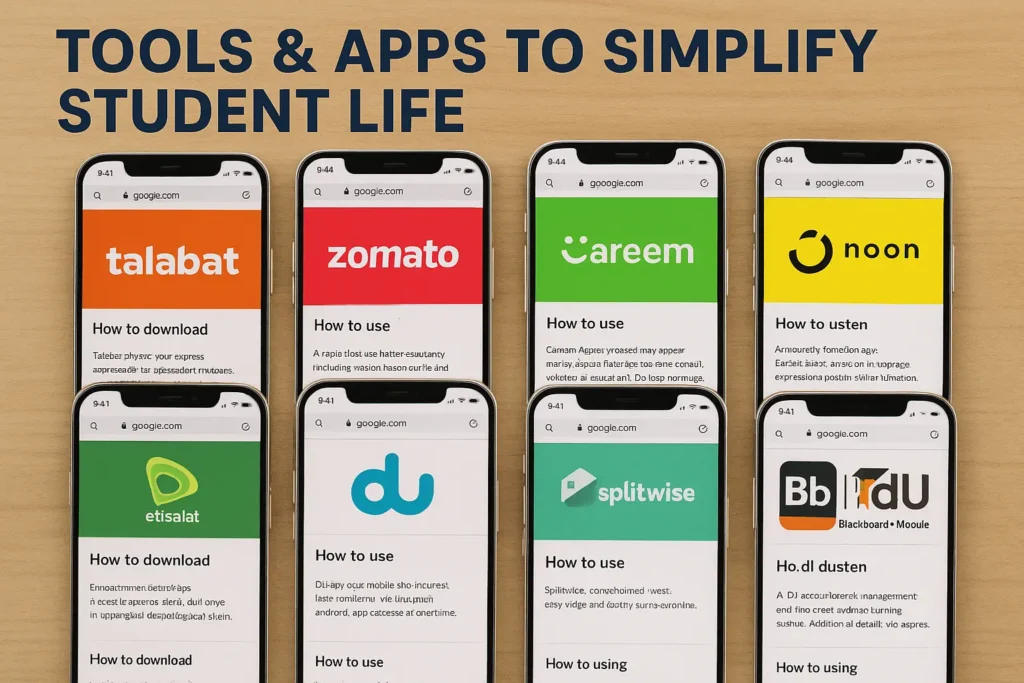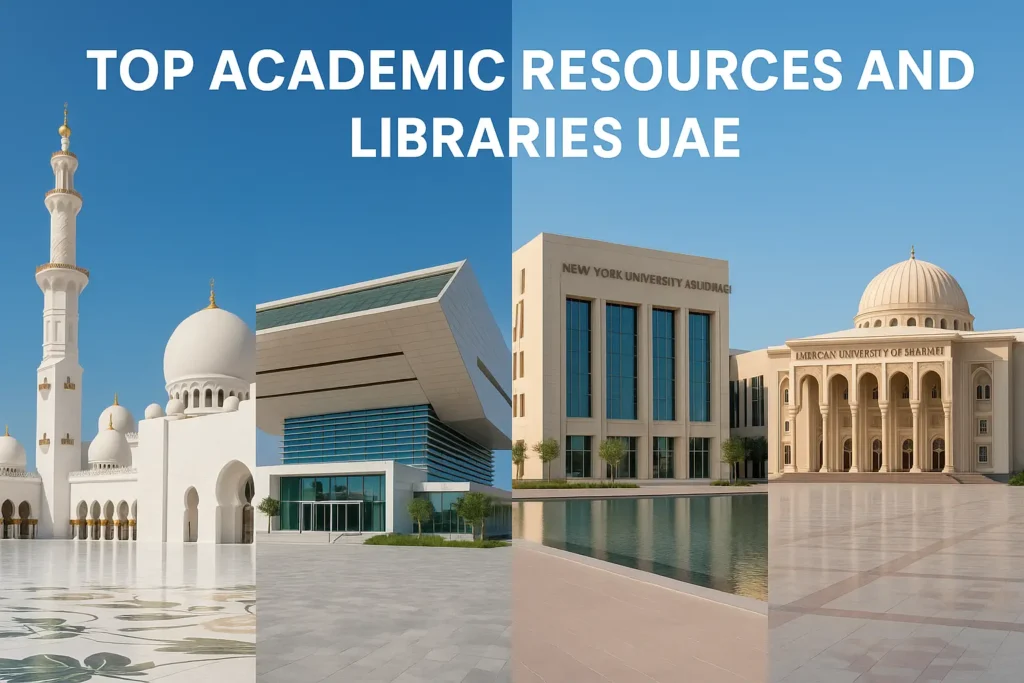Your first year in UAE as a student is a life-changing experience. Whether you’re attending Abu Dhabi University, Khalifa University, or any institution across Dubai, Sharjah, or Al Ain, it’s essential to plan ahead. From budgeting and finding housing to part-time job hunting, this complete 2025 guide will help you make smart choices for your academic and personal success.
Budgeting for Students in the UAE
Staying financially healthy is the first step to success. Most international students face challenges in managing finances during their first year in the UAE. Here’s how to create a smart budget:
How Much Do You Need Monthly?

- Rent (Shared Accommodation): AED 1,000–2,500
- Food: AED 500–800
- Transportation: AED 200–300
- Mobile & Internet: AED 100–200
- Miscellaneous: AED 300–500
Budgeting Tips:
- Use apps like Spondee or YNAB to track expenses.
- Look for student discounts on groceries, transport, and restaurants.
- Avoid overspending on weekend outings and fast food.
Affordable Housing Options
Housing in the UAE for students varies in price depending on location and amenities.
Student Housing Options:
- University Dormitories: Safe and convenient; AED 2,500–3,500/month
- Shared Apartments/Villas: AED 1,000–2,000/month
- Bed Spaces: Budget option, AED 500–1,000/month (popular among South Asian expats)
Popular Student Areas:
- Abu Dhabi: Khalifa City, Mussafah
- Dubai: Al Nahda, Karama, Deira
- Sharjah: Al Majat, Al Qasimi
Always verify landlord credentials and contracts to avoid scams.
Transportation & Daily Living Costs
Managing transport is crucial in your first year in UAE as a student. Most cities have reliable public transport systems.
Transport Options:
- Public Buses & Metro (Dubai): AED 3–7 per ride
- Abu Dhabi Darb Card: Monthly pass ~AED 80
- Ride-Hailing Apps: Careem and Uber offer student promos
- Bike Rentals & Walking: Great for short-distance travel in student areas
Finding Part-Time Jobs as a Student
While studying, many students look for flexible, part-time work to support their expenses.
Legal Work Rules:
- You must have a work permit from your university or MOHRE
- Only designated jobs in specific sectors are allowed
- You must be 18+ years old
Top Part-Time Job Options:
- Retail stores and shopping malls
- Restaurants and cafes
- Campus-based jobs (library, admin, tutoring)
- Freelancing (graphic design, social media, writing)
Legal Work Requirements for Students
The UAE now allows part-time work for international students under specific conditions:
- Must be enrolled full-time at a licensed university
- Employer must sponsor the part-time permit
- Valid residency visa & Emirates ID required
- Weekly limit: ~15–20 working hours
Apply through your university’s career office or directly via MOHRE’s student permit program.
Time Management Tips for Balancing Work and Study
Balancing work, study, and life during your first year in UAE as a student is challenging but doable.
Top Productivity Hacks:
- Use a digital calendar (Google Calendar or Notion)
- Prioritize academics; never compromise grades for part-time income
- Join university clubs for social connection without time waste
- Keep weekends for rest or networking, not just entertainment
Where to Look for Jobs in UAE
Finding reliable job platforms is key. Always use trusted sources:
Best Job Search Platforms for Students:
- Provideajob.com – Daily Latest Updates of Walking Interview Listings
- Bayt.com – Search for entry-level & part-time jobs
- GulfTalent – Offers internship listings
- Indeed UAE – Student and fresh graduate job filters
- University Career Portals – Often have exclusive listings
- LinkedIn – Great for networking and visibility
Set up job alerts and keep your resume updated.
Common Challenges & How to Overcome Them
Here are the top issues most students face in their first year in UAE as a student:
Common Challenges:
- Homesickness & culture shock
- Budget mismanagement
- Scams in housing and job offers
- Language barriers (especially outside of universities)
Quick Solutions:
- Join student communities & WhatsApp groups
- Use translation tools (Google Translate, U Dictionary)
- Always verify before paying deposits or accepting jobs
- Attend free university counseling sessions
Tools & Apps to Simplify Student Life

Must-Have Mobile Apps:
- Talabat / Zomato – Affordable food delivery
- Careem / Uber – Safe transportation
- Etisalat / DU – Mobile recharges & bundles
- ADU / Blackboard / Moodle – Access academic resources
- Split wise – Share rent and bills with roommates
These apps will help manage daily tasks with ease.
Cultural Awareness: Respecting UAE Traditions
Respecting local culture is key to thriving in your first year in UAE as a student. While the UAE is modern and diverse, it remains rooted in Islamic customs.
Essential Cultural Do’s and Don’ts:
- Dress modestly in public areas, especially in mosques or government buildings.
- Public displays of affection are discouraged.
- Always use the right hand when giving or receiving items.
- Friday is the official weekend day, and most offices close for Jumma (Friday prayers).
- Avoid discussing politics or religion in public or online.
Opening a Student Bank Account
Financial stability is crucial during your first year in UAE as a student. Opening a student-friendly bank account helps with managing tuition, rent, and daily expenses.
Best Banks Offering Student Accounts:
- Emirates NBD
- Abu Dhabi Commercial Bank (ADCB)
- Mashreq Neo
- FAB (First Abu Dhabi Bank)
Required Documents:
- Passport copy
- Emirates ID (or application)
- University admission letter
- Visa page
Top Academic Resources and Libraries

Academic success is the core of your first year in UAE as a student. Leverage local and digital resources for efficient study.
University-Based Resources:
- Digital Libraries: ADU Blackboard, JSTOR, ProQuest
- Language Labs: Enhance English or Arabic skills
- Academic Writing Centers: Get help with essays and citation styles
- Online Subscriptions: Coursera, edX, LinkedIn Learning (often free through university)
Public Libraries:
- Mohammed Bin Rashid Library (Dubai)
- Khalifa Park Library (Abu Dhabi)
- Sharjah Library
These places offer quiet spaces, free Wi-Fi, and even student workshops.
Visa Renewals and Residency Tips
Understanding your visa responsibilities is essential during your first year in UAE as a student.
Key Points:
- Student visas are usually valid for 1 year
- Your university sponsors your visa
- Always renew 1 month before expiry
- You’ll need an Emirates ID renewal, medical fitness test, and updated passport
- Work permits (for part-time jobs) require separate MOHRE approvals
Late renewals may lead to fines (AED 25/day) or suspension from studies.
Explore & Enjoy: Student-Friendly Attractions
All work and no play makes your first year in UAE as a student boring. UAE has many budget-friendly places to relax or learn.
Top Budget Destinations:
- The Louvre Abu Dhabi – Student entry AED 30
- Dubai Frame – AED 20 with ID
- Qasr Al Hosn – A cultural gem in Abu Dhabi
- Al Majazz Waterfront (Sharjah) – Great for picnics and night walks
- Global Village (seasonal) – AED 25, food and culture from 90+ countries
Cyber Safety & Scams to Avoid
Protecting your identity and finances is vital in your first year in UAE as a student.
Common Scams:
- Fake landlords asking for deposits before viewing
- Job offers that ask for “processing fees”
- Emails pretending to be from banks or visa offices
- Social media giveaways asking for personal details
How to Stay Safe:
- Never share your Emirates ID or passport copy online
- Use strong, unique passwords
- Only pay via verified platforms like Noon, Amazon, or Careem
Report fraud to Dubai Police ecrime or Abu Dhabi Police Aman Service.
Own Your First Year With Confidence
Your first year in UAE as a student is the perfect time to explore, grow, and adapt. With the right knowledge, local awareness, financial strategy, and digital tools—you can navigate this journey successfully.
